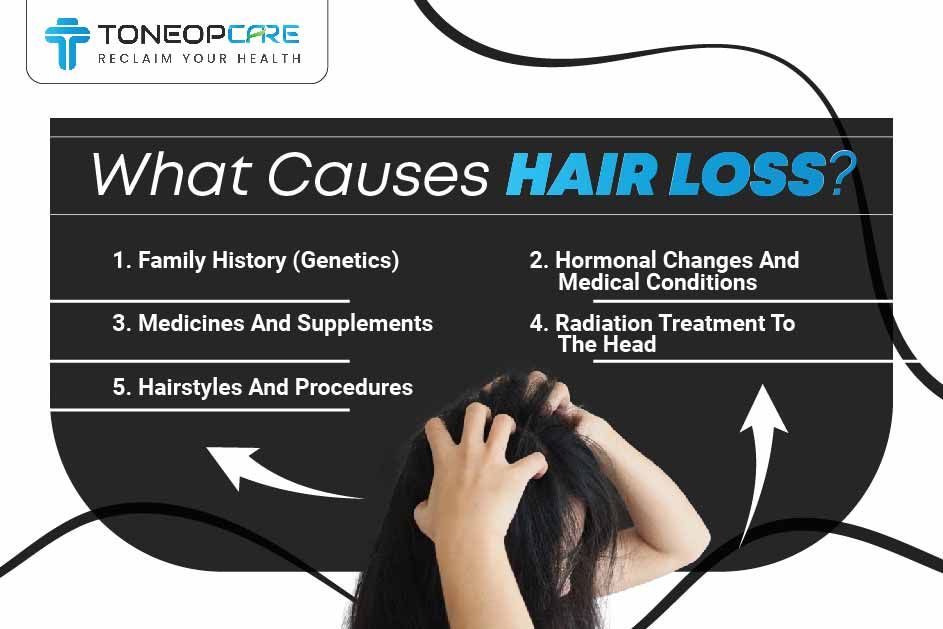We assure you that you won’t be alone on your journey towards becoming your healthier self.
Health & Wellness
What Is The Reason For Hair Fall? Know 5 Causes And Prevention Tips Here!

Imagine waking up and running your hand through your hair, only to feel like more strands of hair have been left behind. This may not be a one-time thing, but re-occurrence only to make you bald. Hair loss, or alopecia, occurs when hair begins to thin, gradually falls out, or in clumps. It is a harsh reminder that age and daily stress may still affect us, even with our gorgeous hair.
Your fight with hair loss is genuine, whether dealing with a receding hairline, thinning patches, or a full-blown follicular fallout. This blog sheds light on what is the reason for hair fall with valuable prevention tips to keep your hair healthy and strong. Keep reading to know more!
Table Of Contents
1. What Causes Hair Loss?
2. How To Prevent Hair Fall?
3. Best Acne Remedy As Per Dietitian's Recommendation
4. The Final Say
5. FAQs
6. References
What Causes Hair Loss?

People typically shed between 50 and 100 hairs every day. Because new hair grows at the same time, it is frequently undetectable. When new hair cannot grow to replace lost hair, hair loss results. Hair loss is generally associated with one or more of the following factors like:
1. Family History (Genetics)
The genetic disorder occurs with age. These conditions are called androgenetic alopecia, male-pattern baldness, and female-pattern baldness. Hair loss usually occurs gradually and in a predictable pattern. The hairline and bald spots most commonly appear in men and women as the hair on the top of the head thins.
2. Hormonal Changes And Medical Conditions
Permanent or temporary hair loss results from several situations, such as hormonal changes brought on by pregnancy, childbirth, menopause, and thyroid issues. The immune system-related condition alopecia areata, which causes patchy hair loss, ringworm infections on the scalp, and trichotillomania, a disorder that pulls hair, are among the medical conditions.
Also Read: Top 10 Collagen Rich Foods For Boosting Skin And Hair Health
3. Medicines And Supplements
Medication and supplements might have conflicting effects on hair loss. Even though they frequently seek to cure and enhance health, some may inadvertently cause the loss of those priceless threads.
Certain drugs, such as those used to treat cancer, arthritis, depression, heart disease, gout, and high blood pressure, can cause hair loss. Similarly, taking too many vitamins might impair hair health.
4. Radiation Treatment To The Head
Because radiation treatment targets rapidly dividing cells, including those in hair follicles, it can cause hair loss. The high-energy radiation damages these cells, interrupting the hair growth cycle and causing thinning or complete hair loss in the treated area.
This effect is usually limited to the area receiving radiation. Hair loss may occur within a few weeks of beginning treatment and can be transient or permanent, depending on the radiation dose and duration. Hair regrowth may occur following therapy, but it may be sluggish and of a different texture or colour.
5. Hairstyles And Procedures
Traction alopecia is a kind of hair loss caused by excessive hairstyles or hairstyles that pull on the hair, such as cornrows. Hot oil treatments or perms can also cause hair loss. If scarring occurs, hair loss may become permanent.
Also Read: Can Black Seed Oil For Hair Transform Your Hair Care Routine? Know It Here!
How To Prevent Hair Fall?
Although you can't prevent all types of hair loss, you can take steps to keep your hair healthy and minimise hair loss. To prevent hair loss:
- Consume a balanced diet that meets your needs for iron, protein, and calories.
- Find ways to deal with stress.
- Monitor for thyroid disease or other conditions that may lead to hair loss.
- Avoid hairstyles that tie your hair too tightly.
- Consider using a cooling cap during chemotherapy.
Best Hair Fall Remedy As Per Dietitian's Recommendation
ToneOp Care's black seed oil capsules are rich in vital fatty acids, antioxidants, and anti-inflammatory properties. This supplement helps with immune system support, healthy digestion, weight loss, and internal skin and hair nourishment. It is the best treatment for reducing hair fall. It also relieves sore joints, encourages natural healing, improves digestion, supports organ health, results in luscious hair with a natural shine, fortifies the immune system, and relieves inflammation, among its other benefits.
Dt. Lavina Chauhan
The Final Say
To summarize, hair loss can be a distressing experience, but identifying the root causes is the first step toward a remedy. By recognizing the cause (genetics, stress, etc.) and adding preventative steps into your routine, you may empower yourself to resist hair loss and keep a healthy, full head of hair.


